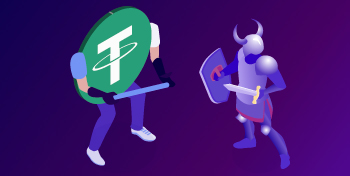Blockchain-based storage solutions such as Filecoin, Siacoin, 0Chain, and Storj enhance the security and privacy of existing cloud storage solutions.
Data privacy and security
The current best – practice approach to data storage is the 3-2-1 rule. The rule states that you must “store three copies of your data on two types of media, and store one copy off-site.” For businesses, businesses, and the government, this is the minimum standard that must be met to protect private information from loss.
However, for most people, this usually means storing on a local hard drive, backing up on an external hard drive, and since the beginning of 2000, important and redundant data stored in the cloud. In this case, “in the cloud” refers to computer storage where digital data is stored in logical pools that are said to be in the “cloud”.
The physical storage of this data can be distributed across multiple servers and in multiple locations owned by the hosting company. Cloud storage companies are responsible for storing this information on the network and making it available in both virtual and physical environments. Individuals, businesses, and governments can buy or lease volumes for data storage. They are accessed through a cloud computing service, API, or applications that use the API, such as desktop cloud storage or content management systems.
Cloud storage is a significant market and is projected by MarketsandMarkets to grow from US $ 50.1 billion in 2020, to us $ 137.3 billion by 2025, at a combined annual growth rate of 22.3% over the forecast period.
The crisis of confidentiality

Data leaks have been in the headlines for decades, and there is no end in sight. The 10 biggest leaks in 2018 affected 2.438 billion personal accounts. Not a week goes by without a major leak, hack, or security breach.
For example, the Times reported this week that ” companies that collect data for pubs and restaurants to help them meet their contact tracking responsibilities collect confidential customer information for sale. Lawyers have warned of a “privacy crisis” caused by the rise of companies using QR codes to get names, addresses, phone numbers and email data before passing them on to marketers, credit card companies and insurance brokers.”
When we see articles like this, you should know that most likely you, as an individual (not a cloud storage company) whose personal identity files were compromised, are now in the hands of potential attackers.
Blockchain solution
A number of blockchain startups have offered blockchain-based alternatives to existing cloud storage providers. Everyone builds his own solution, but the models are similar. The decentralized cloud storage platform will have several advantages over existing vendors. These may include better security, anonymity (without registration), no servers, lower costs, monetization capabilities, and no trusted third parties.
Cloud storage on the blockchain divides data into several encrypted segments, which are linked together using a hashing function. These segments are secured and distributed over a decentralized network. Strong encryption using public / private keys and hashed blocks provides extremely reliable security that even experienced hackers can’t crack.
In addition to putting your data out of the reach of hackers, the public and verifiable nature of blockchains allows users to track their storage and backup history to make sure that the original information was not tampered with.
In 2017, several blockchain startups held ICO and entered the category of cloud storage. They promised increased security, fast data access, and regulatory compliance. These projects included:
- Filecoin: 257 million was raised in September 2017
- 0Chain has attracted 40 million in February 2018.
- Storj has attracted 30 million in may 2017.
- Siacoin: funded by SiaFund and venture capital investors in Nebulous (10 million). The beta was launched in March 2015.
Each of these blockchain projects solves the problem of cloud storage with a slightly different value proposition. A decentralized storage solution eliminates most of the risk of data hacking and use, both intentional (organizations that collect and store data, provide or sell it to third parties, including governments) and unintentional (hacking and theft).
Filecoin
Filecoin (FIL) describes itself as a decentralized storage network designed to store humanity’s most important information. Filecoin was developed by Protocol Labs, in San Francisco, with the support of venture capital firms Andreessen Horowitz and Sequoia Capital. The founder of Filecoin, Juan Benet, positions The network as a new-generation trading platform for data storage. Filecoin is a potential competitor to centralized storage providers Amazon, Dropbox, and Google, as well as content delivery networks such as Cloudflare.
Three years after its record-breaking initial coin offering (ICO) of $ 257 million, the Filecoin network is finally close to launching. The startup says its main network will launch in block 148,888, which is expected this week.
Like many ICO projects, Filecoin missed deadlines. For example, it was first planned to be deployed on the main network in mid-2019. Today, Filecoin has more than 200 projects and 1,000 developers ready to continue working on the Protocol after its launch this week.
0Chain
0Chain’s (ZCN) product, 0Box, is a web platform, desktop and mobile, for storing and sharing personal data, including automatic downloading from a mobile device and smart syncing on the desktop. Its goal is to improve the current centralized storage privacy, transparency, and private and anonymous exchange. On September 10, 0Chain launched the beta version of 0Box for iOS. 0Box is a private cloud that allows you to share personal files anonymously. This does not require a login or email credentials.
Saswata Basu, founder of 0Chain, says that “0Box is the first private cloud with anonymous exchange. Users are free from the fear of hacking and exposure. It is expected to surpass DropBox, even though our core values are privacy, anonymity, and transparency.”
After the user downloads the 0Box app, available for iOS and Google Play, the user can create an account using their mobile phone number and start storing and sharing files with anonymity and privacy.
The 0chain privacy Protocol grants the client ownership and control over their data. It protects them by distributing them to servers with cryptographic keys registered in the block chain, so that the hacker needs all the keys, which makes it almost impossible to break in. In addition, 0Chain constantly writes all actions to the registry. In addition, 0Chain provides secure data exchange with customers, partners, internal groups, and employees.
The dStorage platform is a proprietary smart contract platform in 0ChainNet, which is a scalable blockchain with no permissions, fast completion, and scalability. Clients are protected using the serverless 2FA Protocol for individuals and the multiple cryptographic signature Protocol for exchanges and businesses.
Initially, 0Chain will focus on consumers (B2C) and blockchain projects, as they are being implemented faster than businesses. Its goal is to attract paying customers in the first quarter of 2021 after the launch of their main network.
STORJ
Storj Labs (STORJ) creates a distributed storage platform that uses the excess capacity available on devices such as servers and individual desktops. The company’s CEO, Ben Golub, says that “the goal is to provide it organizations with an alternative to low-cost data storage using storage resources tested by Storj Labs.”
Storj Labs has created an open source object storage system that is compatible with the S3 API used by Amazon Web Services (AWS). It is called the decentralized cloud storage service for tardigrades, and is named after the infamous robust and hard-to-kill tardigrade microorganism. The open source network has a capacity of about 19 petabytes (19 million gigabytes), and is hosted on thousands of nodes around the world.
When a new file is uploaded, it is encrypted and then split into 80 fragments, which are then distributed to individual nodes. If any individual node is compromised or disabled, the user will only need 29 parts to recover the file.
Storj Labs pays companies and individuals who have excess storage capacity, giving these parties the opportunity to monetize the excess capacity. Each storage provider must pass a series of data management tests over a period of time before being allowed to become a Tardigrade member.
Siacoin
The Sia blockchain storage ecosystem is being developed by Nebulous, Inc., established in 2014. It launched The SIA storage platform in March 2015. Based in Boston, Nebulous is funded by Raptor Group, First Star Ventures, Fenbushi Capital, and INBlockchain.
Sia aims to reinvent cloud storage. As in the case with Storj, Sia says: “Our technology connects users who need file storage with hosts around the world that offer under-loaded hard drive capacity. Blockchain technology protects their data and makes it more cost-effective for users and hosts.”
Members of the Sia network can rent hard disk space from each other. This decentralized approach makes Sia a safer and cheaper solution than using a provider like Amazon. Users who have unused hard disk space can rent it out and monetize it in the form of siacons (SC).
The Sia blockchain allows the Sia market to operate without a Central third party. Sia secures storage transactions using smart contracts, creating a reliable, secure, and affordable data storage product. Sia States: “No individual or organization can censor or deny access to data – not miners, developers, or any government. We believe that SIA’s distributed decentralized storage technology is stronger, safer, more efficient, and fairer for all ecosystems.”
Conclusion
Existing cloud storage providers must duplicate any user data they store to ensure the necessary level of reliability (redundancy). If the user is not allowed to use client-side encryption, the files are usually stored on the server “as is”. This way, anyone who gets sufficient access rights on this server can access the files.
As blockchain cloud storage solutions begin to enter the market, offering enhanced data security and additional services such as user-controlled encryption and privacy sharing, traditional operators will begin to realize how blockchain can improve their services. Whether they will collaborate with existing vendors, find white label solutions, or develop their own blockchain solutions from scratch remains to be seen.
It will take time for companies and organizations to get comfortable and consider decentralized storage services as an alternative to public cloud organizations. However, given the blockchain’s ability to provide the highest possible level of security through tamper-proof auditing, once solutions become Mature, there is a ready-made market.


